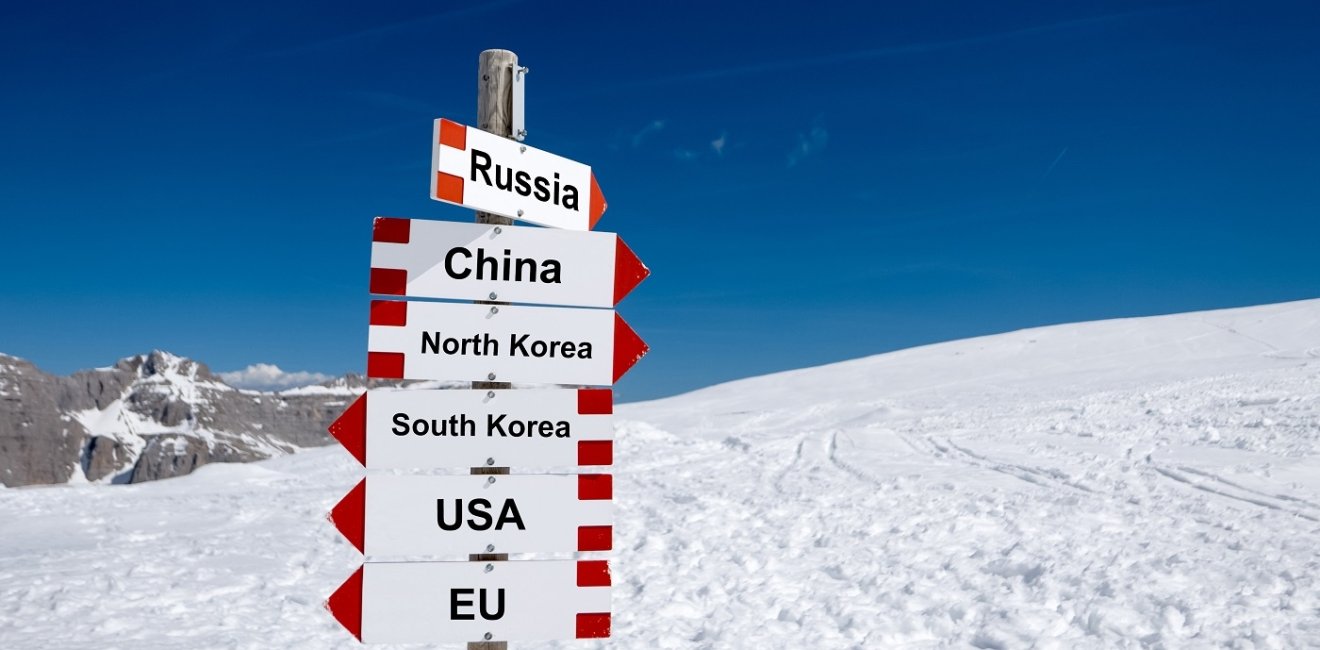
A blog of the Kennan Institute
BY KIRILL ROGOV
Fifty years ago, in the summer of 1972, the last sections of the gas pipeline between the USSR and Western Europe neared completion in Czechoslovakia. Three years earlier, at a meeting in the Kremlin, the Politburo had approved the historic "pipes for gas" deal providing for delivery of large-diameter pipes from West Germany to the Soviet Union to be used in pipeline construction.
Thus began a long era of energy cooperation between Europe and the USSR/Russia, underpinning an association that proved resilient to political and social divisions. It is now coming to an end before our very eyes.
For the Soviet leadership, the motivation for this historic deal was twofold. First, the leadership lacked confidence, having realized that under socialism it could not provide for a growth in consumption approaching the consumer boom that had started in the West, and therefore needed hard currency to boost imports. And second, a sharp uptick in hostile relations with China led the Politburo to conclude that a détente in the Western direction could be useful. At the time, China felt like a more real and immediate threat.
Today that perspective is reversed: the Russian leadership views the West as posing the existential threat, while China is seen as a rearguard ally. The new perspective is abundantly evident in the Kremlin’s decision to enter into a brutal conflict with the West, a conflict that heavily threatens the energy alliance. Russia’s cautious maneuverings with the West have been abruptly terminated; the peace pipe has become the pipe of war. That change abets China’s rise.
Reconfiguring Relationships of Power and Ideology
The changing relations in the triangle of Russia, China, and the West soar far beyond geopolitical alliances, however. Fifty years ago the tense rivalry between capitalism and socialism was at the center of history, with the USSR/Russia on one side of the conflict and the West on the other.
Today this confrontation lies far in the past, while a new rivalry is coming to the fore, the one between liberal and illiberal capitalisms. But whereas one pole of this new conflict is the West (again), the other is China. Although the geography of illiberal capitalism is not limited to that eastern nation’s borders, it is China that lays claim to be the flagship superpower of this camp.
Where should Russia be positioned in the coming ideological competition between China and the West?
This confrontation is shaping up to be the central plot of human history in the coming decades, just as the rivalry between capitalism and socialism once was. And just as in the last century, an important part of this contention will be the struggle for the nations in between, especially the largest ones—India, Brazil, and Russia.
Is Russia Part of Europe, or Not? Two Perspectives
Setting aside for a moment the terrible war in Ukraine and the retaliatory flood of sanctions, one might ask where, in principle, Russia should be in this competition.
Russia’s position in a future scenario depends, of course, on the leadership’s actions, but also, to a high degree, on one’s perspective. The view of Russia from London, Vienna, or Berlin is that it certainly is not part of Europe, it is not a Western nation. But the Asian perspective on Russia is very different.
A Russian journalist once described to me her conversation with the mayor of Vladivostok, Russia's easternmost major city on the Pacific coast. To her remark about the distance between the city and Europe (5,000 km, or about a twelve-hour flight, separates Vladivostok from Berlin), he responded, "You do not understand. Just get on a plane and fly to the nearest major Chinese city. It's 700 km away, the same distance as from Moscow to Minsk. When you get off the plane you will immediately understand where Europe is and where Asia is. People there go to Vladivostok to see what a European city looks like, if it's too expensive for them to fly to actual Europe.” From Asia, Russia looks to be European more than anything else.
For about three centuries, Russia has been a semi-Europe. Always semi, but always more Europe than anything else. The six-plus decades of communism were probably the most radical attempt to make Russia a non-Europe, an alternative to Europe. Today, with the passage of time, it seems more obvious that the Soviet regime created largely by Stalin was constructed as a kind of alternative to the European order, and it was anti-Westernism that was its foundational principle, much more so than the ideal of universal equality.
The Soviet regime’s rejection of market principles and of private property was not an end in itself, as was long thought, but rather a means of expropriating and concentrating resources for the purpose of confronting and opposing the West. But this regime too, once it felt its lack of self-sufficiency, turned to the West.
War as a Means
From this perspective, the war in Ukraine initiated by Putin, at first glance completely irrational and undermining the economic potential of Russia in the name of unclear and vaguely defined goals, appears to be a way to ensure the most reliable, comprehensive, and long-term break with the West. The war is designed to reconfigure Russia and present it to the world as an essential participant in the illiberal coalition and its "offensive fortress.”
But this place and role for Russia are not so much the result of the country’s long-term social and institutional track, nor are they an established fact. Rather, they represent a radical effort to undo the generally pro-Western evolution of Russia since the mid-1980s. The war is designed to reverse this trend once and for all, just as Putin promises to reverse gas flows from the West to the East.
Regardless of whatever Putin manages to achieve in Ukraine, it is on the domestic front that he is winning his most important war, turning Russia into an Asian despotic regime separated from Europe by a deep moat.
The war has facilitated Putin’s turning the screws on Russia and abolishing critical elements of its semi-European social order (the freedom to travel abroad and safely return, for instance) at a pace inconceivable to observers and unavailable to him just a couple of years ago. Dozens of media outlets have been shut down. Certain opinions and words—such as calling the war a war—have become a cause for criminal prosecution. Thousands of opposition journalists and civil activists have fled the country under threat of persecution, just as in the 1920s.
All this, together with the notorious "traditional values" rubric foisted on the Russian public and a few geopolitical and historical myths that are now revered as the new “regime Bible,” point to Russia turning into a kind of "orthodox Iran” on Europe’s borders.
The sad paradox is that war is such a powerful tool that it not only allows Putin to sever with one stroke the thousands of threads built up over decades to link Russia with the West, but also to turn the West into his willing accomplice in his ultimate campaign to dewesternize Russia.
According to a recent European Council on Foreign Relations poll, more than 60 percent of Europeans favor a complete dismantling of all economic ties with Russia, and more than 50 percent favor a complete severance of cultural ties. The sentiment is understandable. Looting, the punitive murders in Bucha, the carpet bombing of Ukrainian cities—all this is not just Putin, it is one face of Russia. Putin's plan for the Ukrainian war is to amplify this face of Russia and show it to the world in such a brutal and graphic way as to leave no doubt that any other face of Russia exists, or, if it does, it is insignificant, marginal, in comparison with this glut of evil.
And that’s exactly how it looks now, but not in a historical perspective. For the past shows that a future Russia's likely and natural place is in a somewhat different location than Putin imagines. It is not in the West, perhaps, but in the semi-West.
The fiftieth anniversary of the completion of a pipeline between Russia and the West is an opportune moment to reflect on Russia’s past and potentially future orientation. The harsh conflict between communist China and the USSR, which helped launch the subsequent strategic energy partnership between Russia and the West, led to one of the most important geopolitical gains of the West during the Cold War. Likewise, the Kremlin's brutal conflict with the West is now China's most important strategic gain in the unfolding new contention. The current conflict in Ukraine is but a waypoint on the changing arc of a global ideological reorientation, one that will require major and minor economies to reassort themselves as well.
This is an expanded version of the author’s opinion piece published by the Financial Times.
The opinions expressed in this article are those solely of the author and do not reflect the views of the Kennan Institute.
Author

Political Analyst, Liberal Mission Foundation

Kennan Institute
After more than 50 years as a vital part of the Wilson Center legacy, the Kennan Institute has become an independent think tank. You can find the current website for the Kennan Institute at kennaninstitute.org. Please look for future announcements about partnership activities between the Wilson Center and the Kennan Institute at Wilson Center Press Room. The Kennan Institute is the premier US center for advanced research on Eurasia and the oldest and largest regional program at the Woodrow Wilson International Center for Scholars. The Kennan Institute is committed to improving American understanding of Russia, Ukraine, Central Asia, the South Caucasus, and the surrounding region through research and exchange. Read more

Explore More in The Russia File
Browse The Russia File
Chechnya as a Model of Modern Russia

Russia’s Indigenous Communities and the War in Ukraine

Gas and Power in a Changing US–Russia Relationship

